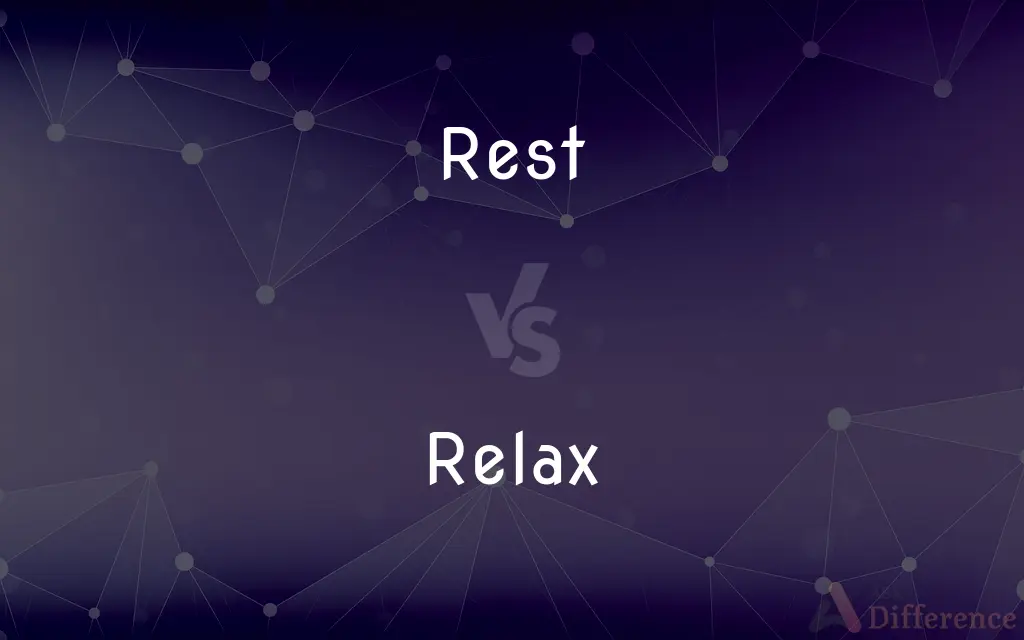Rest vs. Relax — What's the Difference?
By Maham Liaqat & Fiza Rafique — Updated on March 11, 2024
Rest involves ceasing physical or mental activity for recovery, while relaxing reduces tension without necessarily stopping all activity.

Difference Between Rest and Relax
Table of Contents
ADVERTISEMENT
Key Differences
Rest typically means a cessation of work, physical exertion, or activity to allow the body or mind to recover and rejuvenate. It often implies a state of minimal activity or sleep, where the body undergoes repair and the mind can unwind from stress or fatigue. On the other hand, relaxing involves engaging in activities or being in states that reduce tension and stress, which may or may not include complete inactivity. Relaxation can be achieved through various means, such as leisure activities, meditation, or simply taking a break from stressful tasks, and is more about achieving a state of mental and physical ease than complete inactivity.
The necessity of rest is often dictated by physical or mental fatigue, requiring a person to stop and recuperate. Rest can be critical for health, allowing for processes like muscle repair, memory consolidation, and the reduction of stress hormones. Relaxation, while beneficial for well-being, is more about reducing stress levels and may not require complete cessation of activity. Activities like reading, listening to music, or gentle yoga can be relaxing yet still involve some level of engagement or focus.
Rest is often structured and intentional, such as setting aside time for sleep each night or taking designated breaks during work or physical activity. Relaxation can be more spontaneous or integrated into one's lifestyle, like taking deep breaths during a stressful moment or enjoying a hobby. The structured nature of rest is crucial for health, as it ensures the body and mind receive the downtime needed for recovery.
While rest often requires a physical state of inactivity, relaxation can be achieved in both active and passive forms. For example, a person might find relaxation in activities that are physically engaging but mentally soothing, such as painting or gardening. This highlights that relaxation is subjective and varies greatly from person to person, depending on what activities or environments reduce their stress.
The outcomes of rest and relaxation, while overlapping in terms of stress reduction and well-being enhancement, have distinct focuses. Rest aims primarily at physical and mental recovery, preparing the body and mind for future exertions. Relaxation focuses on immediate stress relief and enjoyment, contributing to an overall sense of well-being and happiness without necessarily aiming for recovery from exhaustion.
ADVERTISEMENT
Comparison Chart
Definition
Ceasing activity to recover physically or mentally
Engaging in activities or states that reduce tension and stress
Purpose
Recovery and rejuvenation of body and mind
Stress reduction and achieving a state of mental and physical ease
Activity Level
Minimal to none, can include sleep
Can include both low-level physical or mental activities
Necessity
Often required due to physical or mental fatigue
More about enhancing well-being, not always necessitated by fatigue
Structured vs. Spontaneous
Typically structured (e.g., designated sleep or breaks)
Can be spontaneous or integrated into daily life
Compare with Definitions
Rest
A period of inactivity or sleep for physical or mental recovery.
After the marathon, she took a day of rest to recover.
Relax
Engaging in activities or states that diminish stress and tension.
Yoga has become her go-to method for relaxation.
Rest
Essential for health, facilitating repair and stress relief.
Regular rest is crucial for maintaining good health.
Relax
Can involve leisure activities that bring joy and ease.
Painting on weekends is his favorite relaxation activity.
Rest
Can be passive, requiring minimal engagement.
She spent the afternoon in rest, reading quietly by the window.
Relax
Not necessarily about inactivity but reducing stress.
Taking short walks is her way of relaxation during work breaks.
Rest
Often structured into daily routines, like sleep schedules.
He follows a strict rest schedule to ensure enough sleep.
Relax
Can be achieved spontaneously, even in brief moments.
Deep breathing exercises offer quick relaxation in stressful times.
Rest
Ceasing all work and exertion to rejuvenate.
The doctor recommended complete rest for a week.
Relax
Subjective, varying greatly with personal preferences.
For some, relaxation comes through quiet meditation; for others, it might be a lively game.
Rest
Cease work or movement in order to relax, sleep, or recover strength
He needed to rest after the feverish activity
I'm going to rest up before travelling to England
Relax
To make lax or loose
Relax one's grip.
Rest
Be placed or supported so as to stay in a specified position
Her elbow was resting on the arm of the sofa
Relax
To make less severe or strict
Relax a curfew.
Rest
Be based on; depend on
The country's security rested on its alliances
Relax
To reduce in intensity; slacken
Relax one's efforts.
Rest
Conclude presentation of either party's case in a suit or prosecution
The prosecution rests
Relax
To relieve from tension or strain
The warm bath relaxed me.
Rest
Remain or be left in a specified condition
You can rest assured she will do everything she can
Relax
To take one's ease; rest.
Rest
An instance or period of resting
A couple of days of complete rest
You look as though you need a rest
Relax
To become lax or loose.
Rest
An interval of silence of a specified duration.
Relax
To become less severe or strict.
Rest
An object that is used to support something
A shoulder rest
Relax
To become less restrained or tense.
Rest
The remaining part of something
What do you want to do for the rest of your life?
I'll tell you the rest tomorrow night
Relax
(transitive) To calm down.
Rest
A small, detached portion of an organ or tissue.
Relax
(transitive) To make something loose.
To relax a rope or cord
To relax the muscles or sinews
Rest
A rally in real tennis.
Relax
(intransitive) To become loose.
Rest
A period of inactivity, relaxation, or sleep:The hikers stopped for a rest.
Relax
(transitive) To make something less severe or tense.
To relax discipline
To relax one's attention or endeavours
Rest
Sleep or the refreshment resulting from inactivity or sleep:Get plenty of rest before the race.
Relax
(intransitive) To become less severe or tense.
Rest
Mental or emotional calm:The news put my mind at rest.
Relax
(transitive) To make something (such as codes and regulations) more lenient.
Rest
The state of being motionless; the absence of motion:The car accelerates quickly from a state of rest.
Relax
To become more lenient.
Rest
The condition of being settled or resolved:a remark that put the matter to rest.
Relax
(transitive) To relieve (something) from stress.
Amusement relaxes the mind.
Rest
An interval of silence corresponding to one of the possible time values within a measure.
Relax
To relieve from constipation; to loosen; to open.
An aperient relaxes the bowels.
Rest
The mark or symbol indicating such a pause and its length.
Relax
To make lax or loose; to make less close, firm, rigid, tense, or the like; to slacken; to loosen; to open; as, to relax a rope or cord; to relax the muscles or sinews.
Horror . . . all his joints relaxed.
Nor served it to relax their serried files.
Rest
A short pause in a line of poetry; a caesura.
Relax
To make less severe or rigorous; to abate the stringency of; to remit in respect to strenuousness, earnestness, or effort; as, to relax discipline; to relax one's attention or endeavors.
The statute of mortmain was at several times relaxed by the legislature.
Rest
A device used as a support:a back rest.
Relax
Hence, to relieve from attention or effort; to ease; to recreate; to divert; as, amusement relaxes the mind.
Rest
(Games)See bridge1.
Relax
To relieve from constipation; to loosen; to open; as, an aperient relaxes the bowels.
Rest
The part that is left over after something has been removed; remainder.
Relax
To become lax, weak, or loose; as, to let one's grasp relax.
His knees relax with toil.
Rest
That or those remaining
The beginning was boring, but the rest was interesting. The rest are arriving later.
Relax
To abate in severity; to become less rigorous.
In others she relaxed again,And governed with a looser rein.
Rest
A support for a lance on the side of the breastplate of medieval armor.
Relax
To remit attention or effort; to become less diligent; to unbend; as, to relax in study.
Rest
To cease motion, work, or activity, especially in order to become refreshed:The laborers rested in the shade.
Relax
Relaxation.
Rest
To lie down and sleep:rested for an hour on the couch.
Relax
Relaxed; lax; hence, remiss; careless.
Rest
To be in or come to a motionless state:The can rolled along, finally resting when it hit the curb.
Relax
Become less tense, rest, or take one's ease;
He relaxed in the hot tub
Let's all relax after a hard day's work
Rest
To be located or be in a specified place:The manuscript rests in the museum.
Relax
Make less tight;
Relax the tension on the rope
Rest
To be fixed or directed on something:His gaze rested on the necklace.
Relax
Become loose or looser or less tight;
The noose loosened
The rope relaxed
Rest
To be unchanged or unresolved:After arguing for an hour, we let the matter rest.
Relax
Cause to feel relaxed;
A hot bath always relaxes me
Rest
To be supported or based; lie, lean, or sit:The ladder rests firmly anst the tree.
Relax
Become less tense, less formal, or less restrained, and assume a friendlier manner;
Our new colleague relaxed when he saw that we were a friendly group
Rest
To be imposed or vested, as a responsibility or burden:The final decision rests with the crperson.
Relax
Make less severe or strict;
The government relaxed the curfew after most of the rebels were caught
Rest
To depend or rely:That argument rests on a false assumption.
Relax
Become less severe or strict;
The rules relaxed after the new director arrived
Rest
(Law)To complete the n presentation of one's portion of a legal case:The defense rests.
Relax
Make less active or fast;
He slackened his pace as he got tired
Don't relax your efforts now
Rest
To cause or allow to be inactive or relaxed so as to ren energy:The coach rested his best players. I rested my eyes before studying.
Rest
To place, lay, or lean, as for support or repose:rested the rake anst the fence.
Rest
To base or ground:I rested my conclusion on that fact.
Rest
To fix or direct (the gaze, for example).
Rest
(Law)To complete the n presentation of (one's portion of a case):The prosecutor was not ready to rest her case.
Rest
To be or continue to be; remain
Rest assured that we will finish on time.
Rest
To remain or be left over.
Rest
Relief from work or activity by sleeping; sleep.
I need to get a good rest tonight; I was up late last night.
The sun sets, and the workers go to their rest.
Rest
(countable) Any relief from exertion; a state of quiet and relaxation.
We took a rest at the top of the hill to get our breath back.
Rest
(uncountable) Peace; freedom from worry, anxiety, annoyances; tranquility.
It was nice to have a rest from the phone ringing when I unplugged it for a while.
Rest
A state of inactivity; a state of little or no motion; a state of completion.
The boulder came to rest just behind the house after rolling down the mountain.
The ocean was finally at rest.
Now that we're all in agreement, we can put that issue to rest.
Rest
A pause of a specified length in a piece of music.
Remember there's a rest at the end of the fourth bar.
Rest
A written symbol indicating such a pause in a musical score such as in sheet music.
Rest
Absence of motion.
The body's centre of gravity may affect its state of rest.
Rest
A stick with a U-, V- or X-shaped head used to support the tip of a cue when the cue ball is otherwise out of reach.
Higgins can't quite reach the white with his cue, so he'll be using the rest.
Rest
(countable) Any object designed to be used to support something else.
She put the phone receiver back in its rest.
He placed his hands on the arm rests of the chair.
Rest
A projection from the right side of the cuirass of armour, serving to support the lance.
Rest
A place where one may rest, either temporarily, as in an inn, or permanently, as, in an abode.
Rest
(poetry) A short pause in reading poetry; a caesura.
Rest
The striking of a balance at regular intervals in a running account. Often, specifically, the intervals after which compound interest is added to capital.
Rest
(dated) A set or game at tennis.
Rest
(uncountable) That which remains.
She ate some of the food, but was not hungry enough to eat it all, so she put the rest in the refrigerator to finish later.
Rest
Those not included in a proposition or description; the remainder; others.
Rest
A surplus held as a reserved fund by a bank to equalize its dividends, etc.; in the Bank of England, the balance of assets above liabilities.
Rest
(intransitive) To cease from action, motion, work, or performance of any kind; stop; desist; be without motion.
Rest
(intransitive) To come to a pause or an end; end.
Rest
(intransitive) To be free from that which harasses or disturbs; be quiet or still; be undisturbed.
Rest
To be or to put into a state of rest.
My day's work is over; now I will rest.
We need to rest the horses before we ride any further.
I shall not rest until I have uncovered the truth.
Rest
(intransitive) To stay, remain, be situated.
The blame seems to rest with your father.
Rest
To lean, lie, or lay.
A column rests on its pedestal.
I rested my head in my hands.
She rested against my shoulder.
I rested against the wall for a minute.
Rest
To complete one's active advocacy in a trial or other proceeding, and thus to wait for the outcome (however, one is still generally available to answer questions, etc.)
The defense rests, your Honor.
I rest my case.
Rest
(intransitive) To sleep; slumber.
Rest
(intransitive) To lie dormant.
Rest
(intransitive) To rely or depend on.
The decision rests on getting a bank loan.
Rest
To be satisfied; to acquiesce.
Rest
To continue to be, remain, be left in a certain way.
You can rest assured that a sick child will say when it's again ready to eat, so it won't starve and doesn't need to be cajoled into eating.
Rest
To keep a certain way.
Rest
To arrest.
Rest
To arrest.
Rest
To cease from action or motion, especially from action which has caused weariness; to desist from labor or exertion.
God . . . rested on the seventh day from all his work which he had made.
Six days thou shalt do thy work, and on the seventh day thou shalt rest.
Rest
To be free from whanever wearies or disturbs; to be quiet or still.
There rest, if any rest can harbor there.
Rest
To lie; to repose; to recline; to lan; as, to rest on a couch.
Rest
To stand firm; to be fixed; to be supported; as, a column rests on its pedestal.
Rest
To sleep; to slumber; hence, poetically, to be dead.
Fancy . . . then retriesInto her private cell when Nature rests.
Rest
To lean in confidence; to trust; to rely; to repose without anxiety; as, to rest on a man's promise.
On him I rested, after long debate,And not without considering, fixed fate.
Rest
To be satisfied; to acquiesce.
To rest in Heaven's determination.
Rest
To lay or place at rest; to quiet.
Your piety has paidAll needful rites, to rest my wandering shade.
Rest
To place, as on a support; to cause to lean.
Her weary head upon your bosom rest.
Rest
To be left; to remain; to continue to be.
The affairs of men rest still uncertain.
Rest
A state of quiet or repose; a cessation from motion or labor; tranquillity; as, rest from mental exertion; rest of body or mind.
Sleep give thee all his rest!
Rest
Hence, freedom from everything which wearies or disturbs; peace; security.
And the land had rest fourscore years.
Rest
That on which anything rests or leans for support; as, a rest in a lathe, for supporting the cutting tool or steadying the work.
He made narrowed rests round about, that the beams should not be fastened in the walls of the house.
Rest
A projection from the right side of the cuirass, serving to support the lance.
Their visors closed, their lances in the rest.
Rest
A place where one may rest, either temporarily, as in an inn, or permanently, as, in an abode.
In dust our final rest, and native home.
Ye are not as yet come to the rest and to the inheritance which the Lord your God giveth you.
Rest
A short pause in reading verse; a cæsura.
Rest
The striking of a balance at regular intervals in a running account.
Rest
A set or game at tennis.
Rest
Silence in music or in one of its parts; the name of the character that stands for such silence. They are named as notes are, whole, half, quarter,etc.
Rest
That which is left, or which remains after the separation of a part, either in fact or in contemplation; remainder; residue.
Religion gives part of its reward in hand, the present comfort of having done our duty, and, for the rest, it offers us the best security that Heaven can give.
Rest
Those not included in a proposition or description; the remainder; others.
Armed like the rest, the Trojan prince appears.
Rest
A surplus held as a reserved fund by a bank to equalize its dividends, etc.; in the Bank of England, the balance of assets above liabilities.
Rest
Something left after other parts have been taken away;
There was no remainder
He threw away the rest
He took what he wanted and I got the balance
Rest
Freedom from activity (work or strain or responsibility);
Took his repose by the swimming pool
Rest
A pause for relaxation;
People actually accomplish more when they take time for short rests
Rest
A state of inaction;
A body will continue in a state of rest until acted upon
Rest
A support on which things can be put;
The gun was steadied on a special rest
Rest
A musical notation indicating a silence of a specified duration
Rest
Not move; be in a resting position
Rest
Take a short break from one's activities in order to relax
Rest
Give a rest to;
He rested his bad leg
Rest the dogs for a moment
Rest
Have a place in relation to something else;
The fate of Bosnia lies in the hands of the West
The responsibility rests with the Allies
Rest
Be at rest
Rest
Stay the same; remain in a certain state;
The dress remained wet after repeated attempts to dry it
Rest assured
Stay alone
He remained unmoved by her tears
The bad weather continued for another week
Rest
Be inherent or innate in;
Rest
Put something in a resting position, as for support or steadying;
Rest your head on my shoulder
Rest
Sit, as on a branch;
The birds perched high in the treee
Rest
Rest on or as if on a pillow;
Pillow your head
Rest
Be inactive, refrain from acting;
The committee is resting over the summer
Common Curiosities
Can one relax without resting?
Yes, one can relax without resting by engaging in low-effort activities that reduce stress without ceasing all activity.
Why is rest important?
Rest is important for physical and mental recovery, allowing for repair, rejuvenation, and reduction of stress hormones.
What defines rest?
Rest is defined as a period of inactivity or sleep aimed at physical or mental recovery.
How does relaxation differ from rest?
Relaxation involves activities or states that reduce stress and tension, which may not necessarily include ceasing all activity.
What are some activities that promote relaxation?
Activities like yoga, reading, listening to music, and engaging in hobbies can promote relaxation.
Can relaxation help with stress?
Yes, relaxation is effective in reducing stress and enhancing overall well-being.
Do all people relax in the same way?
No, relaxation is subjective, and what is relaxing for one person may not be for another.
How does physical activity fit into relaxation?
Physical activity can be relaxing for some, provided it is low-intensity and enjoyed, such as gentle walking or gardening.
Is sleep considered rest or relaxation?
Sleep is considered a form of rest, as it involves inactivity and is essential for recovery and health.
Is rest always planned?
Rest, especially in the form of sleep or designated breaks, is often planned and structured to ensure recovery.
Why might someone choose relaxation over rest?
Someone might choose relaxation over rest to reduce stress or enjoy leisure activities without the need for complete inactivity or sleep.
How does one find the best relaxation technique?
Finding the best relaxation technique involves experimentation and identifying what activities or practices most effectively reduce personal stress.
How does relaxation impact mental health?
Relaxation positively impacts mental health by reducing stress, anxiety, and improving mood.
Is it possible to relax while working?
Yes, incorporating relaxation techniques like deep breathing or brief mindful moments can reduce stress while working.
Can too much rest be harmful?
Excessive rest, especially if not needed for recovery, can lead to negative effects like reduced physical fitness and mood issues.
Share Your Discovery

Previous Comparison
Strategy vs. Tactic
Next Comparison
Whir vs. WhirlAuthor Spotlight
Written by
Maham LiaqatCo-written by
Fiza RafiqueFiza Rafique is a skilled content writer at AskDifference.com, where she meticulously refines and enhances written pieces. Drawing from her vast editorial expertise, Fiza ensures clarity, accuracy, and precision in every article. Passionate about language, she continually seeks to elevate the quality of content for readers worldwide.















































